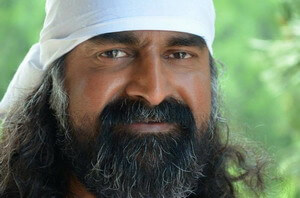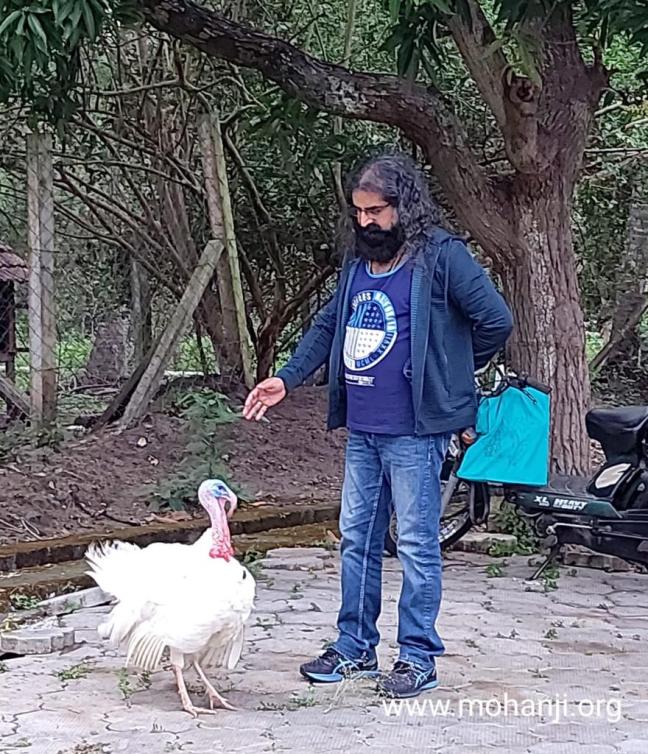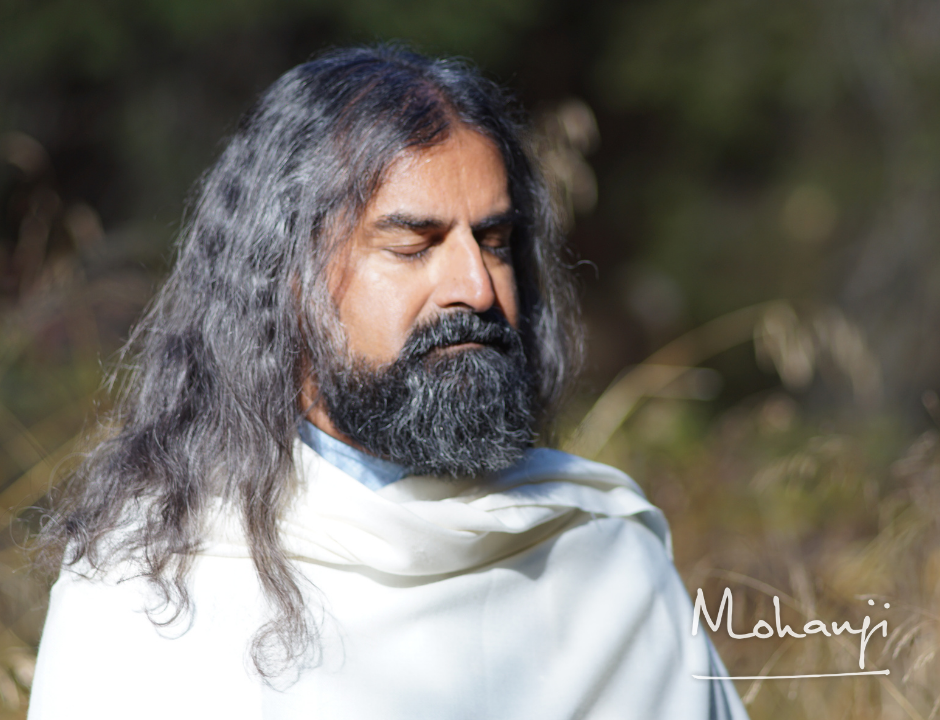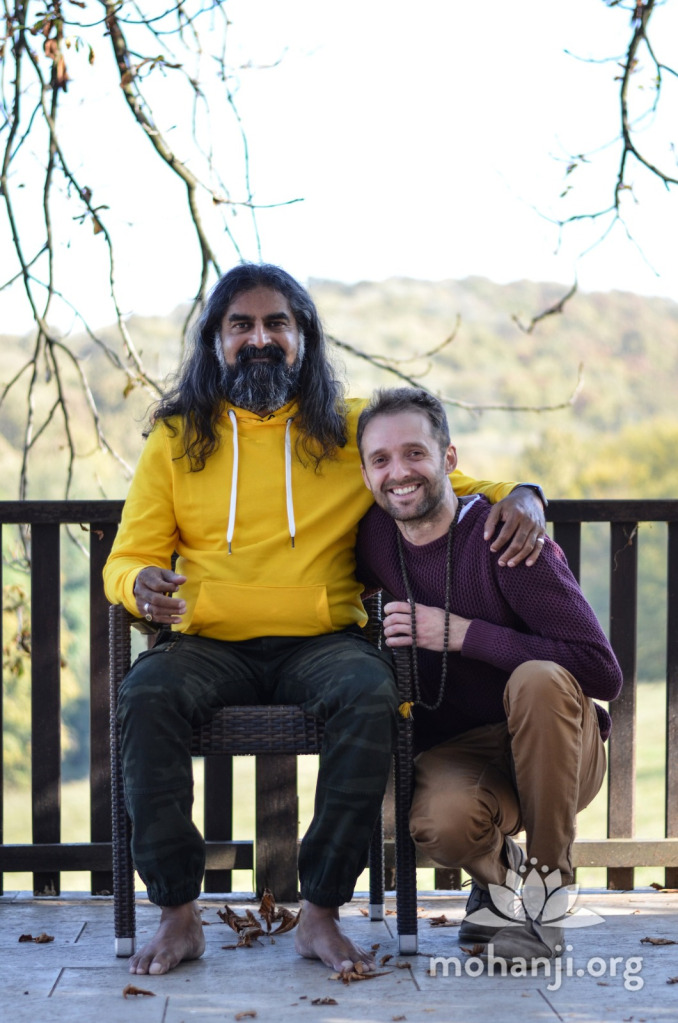By Christopher Greenwood
Day 21 Lesson – Enhance your productivity, eat consciously
This lesson today was me remembering advice which Mohanji gave me, when I was first finding my feet here at the house, trying to match his pace of activity in the early months. I say match his pace, but even that pace was a slowed-down pace for Mohanji. And it was about food, and the effects that food can have on our productivity.
Before I share that, I wanted to give a bit of color to the house here, because this morning, when I went to Mohanji’s room, I had an experience that showed that even animals (and all beings) are very, very keen to see Mohanji.
So, around the house I’ve mentioned before that many beings come to see him. We have the birds, there’s the squirrels, and small beings such as ants. And now there’s a very demanding cat that’s turned up from somewhere – really loud and always looking for food. And the squirrels don’t like the cat. They’ll shout and scold from the trees, and that’s really loud as well, like a car alarm. There’s so much happening in the morning! And we put food out regularly. In the morning, Mohanji will sit in his room on his chair next to the bedroom window. He’ll raise the curtain and open the window, because the birds come. And they’ll sit, and they’ll sing. And they’ll greet him. And they don’t really want anything, they just come to see him and they’re happy. And when you look at Mohanji, it also makes him happy too, he’s smiling.
And there’s one squirrel who loves to come close all the time. He’ll climb up to the window, lift his head up and just check around to make sure Mohanji is there. Then he’s happy and he carries on with his day. Some months back, Mohanji used to eat his lunch downstairs, where they’d be facing across the table at the patio doors to the garden and the wall, where we feed the animals. The squirrel would come for lunch. But a few months back, Mohanji hurt his foot, so he was in his room for a lot of the time. And this squirrel would come looking for Mohanji, just to try and catch a glimpse and see him. I remember as well that the squirrel was up one day when I was in his room, looking around, trying to look through the gaps in the curtains to see if Mohanji was there. It’s really cute.
This is a side story, but related to food. We have breakfast, lunch and dinner here as most people would. The food’s really tasty, and for me it was quite a novelty, because I’m new to Indian foods – the dosas, the upma and everything. I really enjoyed it, so I’d eat a lot. And as my honeymoon period from when I first arrived, started turning into more work, the pace increased. And it was a little bit of a struggle. I was finding myself tired because of getting up early, getting into that Early Bird morning routine. It took some time.
I remember Mohanji saying one morning, “You’re amazing, you know…. in my presence and in the energy of this house, you’re actually becoming tamasic!! Like it’s really, really special.” Now, it sounds funny, but at the time, it definitely wasn’t funny. Because it was a struggle, with tiredness during the day, lack of energy – overall sluggishness.
And he shared a story, a Master-disciple story. It was someone who had been on a search, on a quest to find his Master, and was seeking enlightenment.
So he asked the Master, “What do I need to do to be enlightened?’”
And the Master gave a one word answer – he simply said, “Food.”
And the disciple was very confused.
He went back and he must have been doing his chores or whatever else he was doing. And after some time he came back, equally as confused, and asked the same question, “How can I get enlightenment?”
And the Master simply said, “Food.”
Then the disciple obviously thought this guy was crazy.
But then something shifted. He started observing food. What was food? What did it mean to him? What was his relationship with food? How much did he crave for food? How much did he desire food? What were the effects of food?
And he began to understand how much binding he had to food, the times that he would eat, the amount, the tastes that he craved, the sweet, the salt, the quantities, how much he was eating unconsciously, even when he wasn’t hungry, just for the activity and the habit of eating.
And from this, he began to realize that there was an unconscious activity and began to discipline himself: mastering what his food intake was.
And I can’t remember the rest of the story, but roughly that was the gist. That was the message I took away.
So he said that he thought my lethargy was mainly due to food, the amount that I was having. And he spoke about yogis, bhogis and rogis. Yogis eat just to sustain the body, and to help them exist. Bhogis eat for entertainment, for the material pleasures. And then rogis are those people who are no longer able to eat because they consumed so much being a bhogi, that they now have some disease.So those classifications: yogis, bhogis and rogis. And I remembered back also to the Acharya training, when he was very clear on the ratio of food that we should have, so that we can maintain concentration, alertness and awareness (because it was an intense program) – having a ratio in the stomach of one third food, one third water and one third air.
But by being conscious, being aware that we only need to really eat to sustain the body, we only need as much food to keep our body functioning and healthy. But we tend to overeat and unconsciously eat, which is definitely what I was doing. I was just taking as much of this good food as I could. I would have finished my breakfast, and the food will still be there and I would think, “Okay, I’ll have some more”, and take it all in.
But what happens then is that all the energy is taken to the stomach for digestion. And most of the time, it’s not even digested because we don’t need that much. Then that creates the feeling of lethargy, of energy drained, of tiredness.
So his advice to me at that time was to try and eat less portions and if possible, cut food portions in half. And for the evening meal, have something really really light. I did this and after a few weeks, I can say it definitely shifted something. I was no longer as tired during the day like after the meals, because I wasn’t eating so much. I didn’t have that slump of energy. And I became more aware as well of the tastes, of the cravings for certain tastes. I also started to avoid the emotional eating that I was doing, or eating just out of habit just because there were some snacks. And this brought more clarity for me and energy to the day.
Now, please, I share this as a lesson, I wouldn’t advise anyone to make any drastic changes in their diets because I’m definitely not a doctor. And it would probably be best to check with the doctor first. But I think the main lesson of it all is being conscious of what we eat, the amount we eat, and how much we’re eating out of habit and emotion, rather than the need of the body for actual sustenance. Overeating and over consumption can bring lethargy, it can bring tiredness. And so when we’re trying to be productive in the day and do what we need to do to make the most of our time, this can be a way where we can really bring some optimization to what we’re doing during the day, to how productive we are during the day.
Day 22 Lesson – From the depths of ignorance, you came with brightness️ and lifted us up
Today I share my understanding of Mohanji, and how he lifts up people in awareness. As I consider him my guru, it is about how a guru lifts people.
The guru-disciple relationship is something which took me some time to understand. And it’s probably difficult for a lot of people to understand too, but it is actually one of the most important relationships, I now feel that we could have in our life. Especially if our goal is higher elevation, and awareness. I mean, if our goal is just to do the same things that we’ve been doing day in and day out – eating, sleeping, drinking, entertaining ourselves, then maybe it’s not so important. But if we’ve reached the point where we want to come out of those habits, patterns and attain something higher, then it’s incredibly important.
And for me, as a Westerner, this concept was completely alien before I met Mohanji, as I used to think that gurus were mainly just people who helped empty your pockets really quickly. And that they were very skilled in acquiring lots of people to come together and help him do work. But now, I understand very differently, as I’ll explain.
What I’ve noticed is that some people may feel it a bit as an obligation: they feel the pressure to do something, or they’re worried about what other people may think. And there are also some people as well, who take it as an option (especially with Mohanji), only when they need something. So for example, my son needs a good grade/ my cat is sick/ I want to leave my husband for this younger man, what shall I do… And I’ve witnessed all varieties handling Mohanji’s time. Some people can be very transactional, but still Mohanji gives what he can. And also from some other stories I have heard of the past, he even knows that some people will eventually betray him, but he still gives what he can. So for him from that point of view, there’s a deeper delivery that he is doing, which is that he is giving completion to people: completion of their desires, of their free will, of what they want to do – he’s giving that.
And what I’ve learned though, is that he’s available to give much more. And often it’s more than what’s physically tangible. I can see how people can be swayed by the opinions of others and also their own prejudices, to quickly throw away a guru when it’s not suiting what they expect
This topic came up this morning because I was having a discussion with Mohanji about the Invest in Awareness program, and what we’re doing with the bootcamp that’s running. And it’s really helping me understand that better with clarity, because what essentially we’re doing is bringing awareness and clarity to people’s lives, so that they can understand themselves better. Because when people can understand themselves – what they are made up of, the mind, the body, intellect, ego, and how those play out through patterns, inclinations, and desires – they can be aware, stabilize, and navigate life better.
And it’s this clarity and awareness that Mohanji has brought to my own life, along with very clear opportunities to move through patterns and comfort zones. For example, one of the more subtler teachings that I’ve got from Mohanji is that each day when I go to see him in the morning, there’s a difference. Sometimes he may appear aloof, and at other times absent, which means he’s probably off doing something else somewhere else, you know. There’s minimal interaction or expression. Sometimes he is engaging, other times in high energy, or sometimes he’ll even say, “Oh, I feel lazy today”, which I know is not true because he has no tiredness. But I remember that he has always said that for what comes in front of him, whoever comes in front of him, he acts as a mirror to this.
And so what I’ve learned is that when in a certain state, or probably a certain frequency, he responds accordingly. And this can be very confusing – especially if I’ve had any expectations, or if I’ve thought I’ve done something well, and maybe thought there’s some praise coming, or had a good idea and wanted some validation. Because he won’t give that. He doesn’t do this, which was confusing at first. But what I realized is that it helps me become more aware of myself whilst I’m here. And I think that’s what he’s doing for all of us. For example, why did I expect praise, what expectations did I have? And so through even those small interactions (say of just a look), I can begin to understand the more subtle patterns that I have. And from that comes more clarity to who I am, as he said.
And as he said before, “the only thing I did in my life was to find myself. And now I’m helping you to find yourself.” And his role in my own personal life became much more clear when I told him one day that I was extremely thankful for what he had done for me because I know it’s the real change. It was when I looked back, and that moment felt immense gratitude because of that change from when I first arrived in the house.
And he simply said, “I did nothing, it’s you who climbed.” That confused me. But thinking about it… First of all, I know it’s not completely true, he does a lot for us. But I think the message he wanted to get across, and what I took, was that he shared with me what the relationship was really, between himself and me, or a Guru and a guide for me. So Mohanji is, as I understand, pointing us all to ourselves. His goal is to liberate as many people as possible from the depth of our sleep. And there’s a lovely Sanskrit saying, which I can’t pronounce, but translated it says, ‘When we were in the depths of ignorance, you came with brightness and lifted us up.’
So what I understand is that Mohanji is available to the world – he’s available for us, he is that road sign, that guide, that person who’s directing us which way to go. And he operates completely from dharmic principles. Free will is completely respected. So he will not push or pull anyone in a direction to do anything against their world. He can’t do that, or he is not allowed. So at best he can be available; he can say, “I think this is the way.” The road sign, the guide, the marker.
And like he said, he’s always holding our hand. He’s there for us. He’s always with us. But he’s never said, “I’m carrying you or I’m always carrying you or pushing you.” So with that understanding, I know that he is guiding the way, he shows the path. But it’s we who walk, or I that walk, with the clarity that he provides. And as we walk, we gain clarity, we gain awareness. And he can help remove obstacles. He can warn us what’s good and what’s not so good, as he sees what the karmic makeup is. But again, he never denies anybody their right to have an experience. So he’ll never say, “Don’t do this or don’t do that.” I think at most he will say, “Are you sure you need to make that trip? Is it really important for you? Do you feel this is the right time to make that change?” He might give a subtle message. But he’ll never say, “Don’t do this.” Because he can’t interfere with our experience, or what we want to experience. And that’s a subtle lesson that I’ve learned and understood. That we are walking, we have our karmic agenda, and he is really there guiding, showing us the way, giving us clarity, giving us awareness, so we can better see where our patterns might take us back into old habits, or where we might run into some difficulty.
And then what else has he done? His goal is liberation – to take as many people there. And he knows that we accumulate a lot of debt being on Earth, we’ve used the resources, we’ve had our relationships, we’ve created whatever we’ve created. And we have to pay that back. And that only comes really through service. So again then, he’s giving the guidance, he’s giving the road, and he’s giving the platform through which we can purify ourselves. And so Mohanji gains nothing in that, nothing really. He benefits nothing. It’s for us.
So this was a big learning for me, it really helped my understanding that Mohanji is available. His hand is there. And he’s provided a platform. And whilst he’s here, we have that benefit of physical interaction, to ask those questions on our path. So it’s a real blessing for us all. I feel really grateful and I also really appreciate that the beauty of it is the free will that we have, or that I have. And there’s no expectations of me here. And he has no expectations of anyone really.
And quoting again the saying I mentioned earlier, this is how I feel that Mohanji is here:
‘When we were in the depths of ignorance, you came with brightness and lifted us up.’
|| JAI BRAHMARISHI MOHANJI||
Edited & Published by – Testimonials Team, 11th April 2021
Disclaimer:
The views, opinions, and positions expressed by the authors and those providing comments on these blogs are theirs alone and do not necessarily reflect the views, opinions or positions of Mohanji, Mohanji Foundation, it’s members, employees or any other individual or entity associated with Mohanji or Mohanji Foundation. We make no representations as to accuracy, completeness, timeliness, suitability or validity of any information presented by individual authors and/or commenters on our blogs and will not be liable for any errors, omissions, or delays in this information or any losses, injuries or damages arising from its display or use.
We reserve the right to delete, edit, or alter in any manner we see fit blog entries or comments that we, in our sole discretion, deem to be obscene, offensive, defamatory, threatening, in violation of trademark, copyright or other laws, of an express commercial nature, or otherwise unacceptable.
Mohanji Testimonials team





